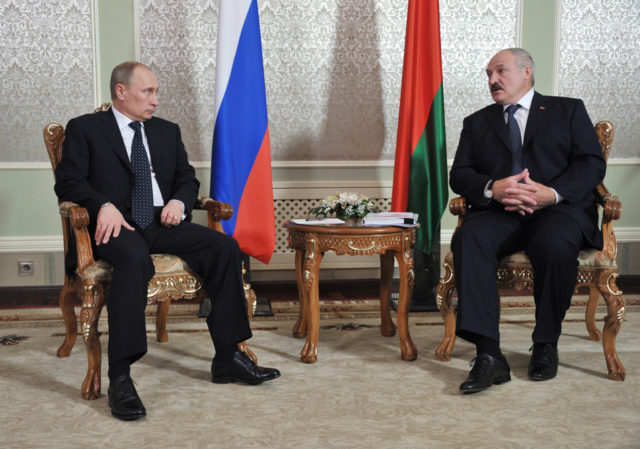
Is Belarus at Risk From an Impatient Russia?
Publication: Eurasia Daily Monitor Volume: 14 Issue: 4
By:

Since the Russian invasion of Ukraine in 2014, Belarus’s strategic position has become riskier and more acutely endangered, a fact the government in Minsk undoubtedly understands quite well. At the same time, Western governments, especially Belarus’s neighbors like Poland and the Baltic States, are watching the evolving relationship between Minsk and Moscow extremely carefully.
One potentially far-reaching development is Minsk’s increasing reluctance to participate further in the Eurasian Economic Union (EEU), Russia’s current favorite vehicle for integrating the former Soviet republics around it. Thus, when President Alyaksandr Lukashenka refused to attend the EEU’s December 21 summit in St. Petersburg, Leonid Reshetnikov, the director of the Russian Institute for Strategic Studies and a known spokesman for the Kremlin, went on Russian television to deny the distinct identity and language of the Belarusian people while criticizing Lukashenka’s excessively independent policies (Osw.waw.pl, January 4, 2017; see EDM, January 18, 2017). In reply, Lukashenka blasted those who sought to portray Belarusians as “rootless and homeless” people. He reiterated that Belarus championed regional integration but would not support a union that was unequal and undermined its independence (Tvr.by, January 11). Moscow retaliated further by airing a television program entitled “Who Will Replace Lukashenka?” (Charter97, January 4). Taken together, this series of incidents strongly resembles what Russians would characterize as the first signs of information war between Minsk and Moscow. This approach confirms what Denis Melyantsov, a senior analyst at the Belarusian Institute for Strategic Studies (BISS), calls the firmly established mode of Russo-Belarusian communication—i.e. diplomatic scandals (Thinktanks.by, January 4).
But these are hardly the only issues roiling the waters between Minsk and Moscow. Belarus insists on receiving subsidized energy from Russia by virtue of its membership in the EEU. Moscow refuses to give such a price break, but Minsk has nevertheless been obstinately paying 39 percent less for Russian gas than their contract stipulates. To try to force Minsk’s hand, Russia reduced its oil supplies to Belarus since June 2016, further exacerbating Belarus’s already ongoing recession. As yet, there has been no agreement resolving the issue. Perhaps even more serious, given existing Russian-Western tensions, is Moscow’s pressure on Minsk to allow for a Russian air base at Bobruisk. This has been complemented by recent Russian deployments to an area around the border with Ukraine that is also close to Belarus. Undoubtedly such an air base and these deployments represent a threat to Belarus and to Ukraine, as well as to the Baltic States and Poland (Osw.waw.pl, January 4, 2017). Following 2014, the “Ukrainian direction” has arguably become much more of a priority concern for both East and West. Consequently, it becomes even clearer why there is great anxiety in Europe and the United States as to what might happen if Russia obtains the rights to use the Bobruisk base or if the information war now playing out between Lukashenka and the Kremlin becomes worse (Kommersant, December 30, 2016).
Although Lukashenka has habitually tried to balance between East and West and enlarge his own sphere of independence in his relations with Russia, since the invasion of Ukraine his position has become that much more precarious. The clear fear is that Moscow, should it feel justified to do so, could try to replicate what it did in Crimea in Belarus—a country that Russia sees as equally vital to its security barrier against the West. Reshetnikov’s recent televised arguments about the lack of a distinct Belarusian national ethos tally well with his and other Kremlin spokespeople’s writings and statements on Ukraine and Crimea, both before and after the invasion. And his remarks are not the only such example, though they may have been the first salvo in this current information war skirmish. Regnum subsequently published an article claiming that developments in Belarus are now moving along the same lines as those that led to the EuroMaidan in Ukraine—a red flag to the leaders in Moscow and clearly a warning shot across Lukashenka’s bow (Regnum, January 4).
Were Moscow to repeat its Crimean adventure in Belarus, the West would see this as a major escalation. Moreover, any Russian move against Belarus would put even greater pressure on the embattled Ukraine, which would now be threatened form three directions: South, East and North. It would also pose major quandaries for the North Atlantic Treaty Organization (NATO): the Alliance has no agreement to defend Belarus, but any potential Russian annexation of Belarusian territory would immeasurably add to the security dangers facing Poland and the Baltic States. And if such an action were to succeed, it would greatly facilitate Russia’s ability to launch offensives into Ukraine or its NATO neighbors by virtue of its increased proximity on another axis to them all.
It is not difficult to imagine such a scenario unfolding over the coming months. Later this year, when Russia holds its formally scheduled exercise Zapad 2017 (West 2017), it will or could deploy tens or even hundreds of thousands of troops to Belarus for maneuvers. And hypothetically, those Russian troops might then refuse to leave and become occupiers on the fabricated pretext that the Belarusian government is somehow mistreating local Russians. That, too, is an old Soviet ploy. In other words, Ukraine and the NATO allies in Central-Eastern Europe may not be the only issues of concern in 2017. Enhanced interest in Belarus’s potential future is needed now rather than later.



